Key takeaways:
- Community outreach fosters understanding, empathy, and a network of support, enhancing advocacy skills through personal interactions.
- Pro-life advocacy is rooted in empathy and education, emphasizing real-life stories and the importance of community engagement to shift societal attitudes.
- Collaboration with local businesses and faith communities enriches pro-life efforts and creates supportive networks that empower individuals facing challenging circumstances.
- Effective advocacy involves active listening, clear communication, and learning from diverse perspectives to create impactful change.
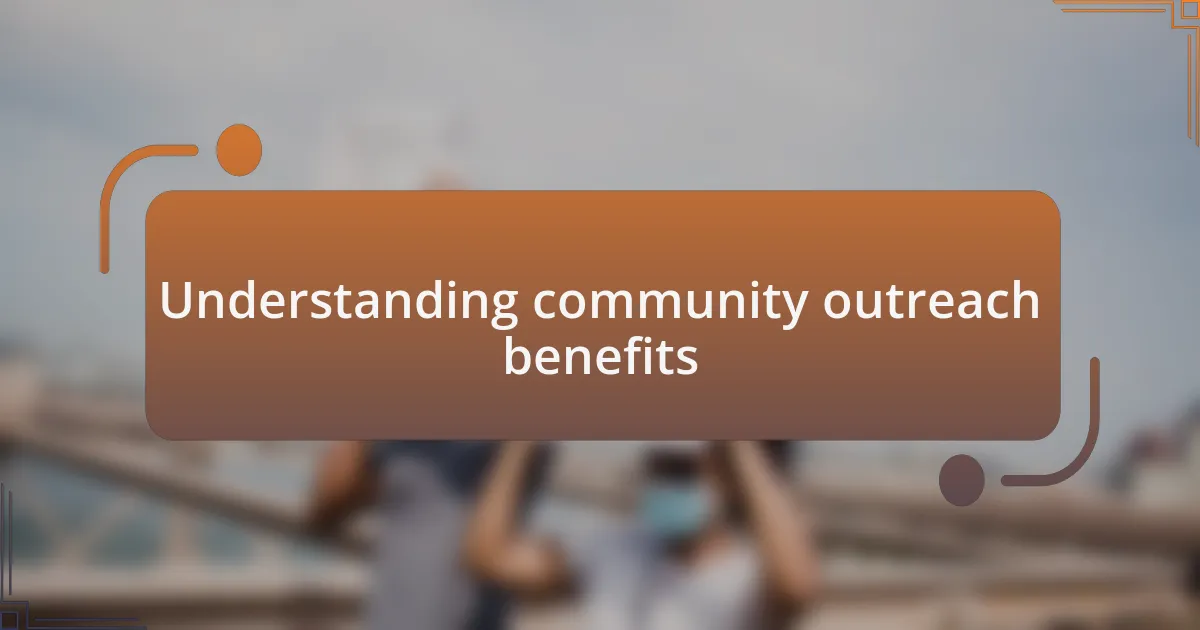
Understanding community outreach benefits
Engaging in community outreach presents a unique opportunity to connect deeply with individuals. I recall a day spent at a local fair where I set up an information booth. The warmth of first-time conversations, punctuated by shared experiences, highlighted how outreach fosters understanding and empathy—key ingredients for any meaningful advocacy.
Moreover, the impact of community outreach extends beyond the immediate conversations; it cultivates a network of support. When I attended a workshop on reproductive health, I met others who shared my passion and concerns. We exchanged stories that not only brought me encouragement but also highlighted the collective power of our voices. Have you experienced a similar moment where you felt a part of something bigger?
The skills I gained through outreach programs are invaluable. From organizing events to effectively communicating sensitive topics, these experiences can sharpen one’s advocacy efforts significantly. Each new interaction, whether it taught me to listen more intently or to speak more persuasively, has enriched my understanding of the community I serve and the diverse perspectives within it. What skills have you developed through your outreach initiatives?
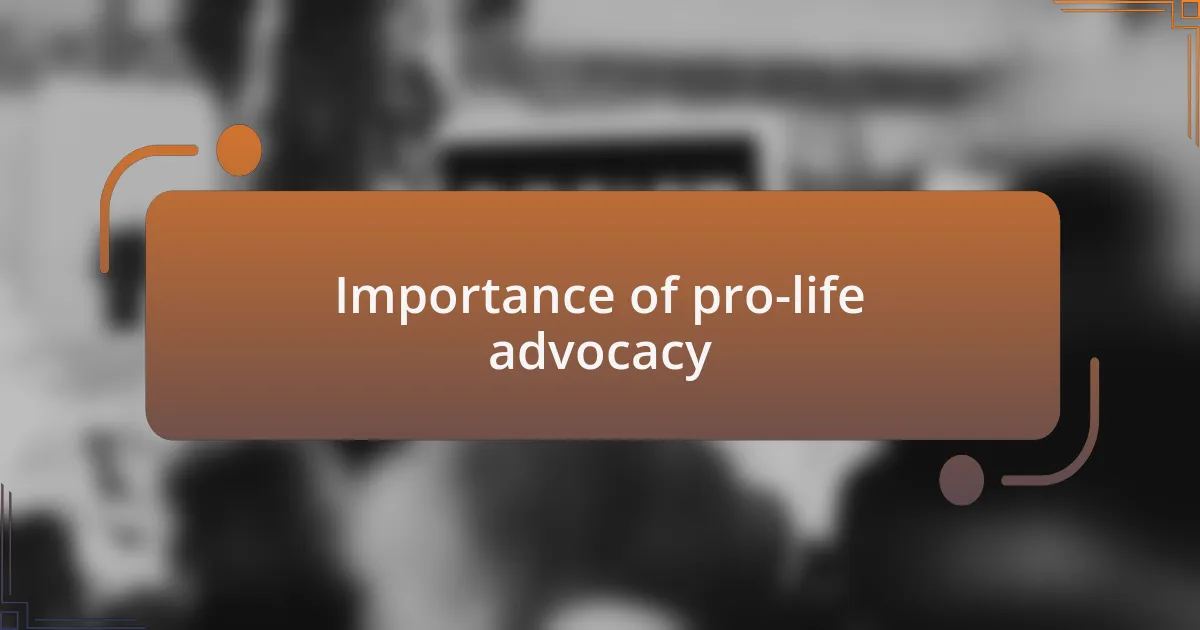
Importance of pro-life advocacy
Understanding the importance of pro-life advocacy is foundational to fostering a culture that values every human life. I remember attending a local community meeting where passionate individuals shared their stories about the struggles and triumphs of pregnancy. Hearing these narratives emphasized to me how pro-life advocacy is not just about policy; it’s about empathy and support for those facing difficult choices. Have you ever reflected on how real-life stories can change our perspectives?
Through my experiences, I have come to realize that pro-life advocacy is vital for shaping societal attitudes. I once participated in a peaceful rally, standing alongside people from diverse backgrounds, all united under a shared belief. The palpable energy in the air made me understand that our collective voice is powerful; it advocates for hope and life in the face of adversity. Isn’t it inspiring to see so many come together for a common cause?
The significance of pro-life advocacy extends to educating others about the value of life. While volunteering at a pregnancy resource center, I interacted with women who were uncertain about their decisions. Listening to their fears and offering them resources opened my eyes to the critical role that education plays in empowering individuals. Have you considered how sharing knowledge can profoundly impact someone’s life choices?
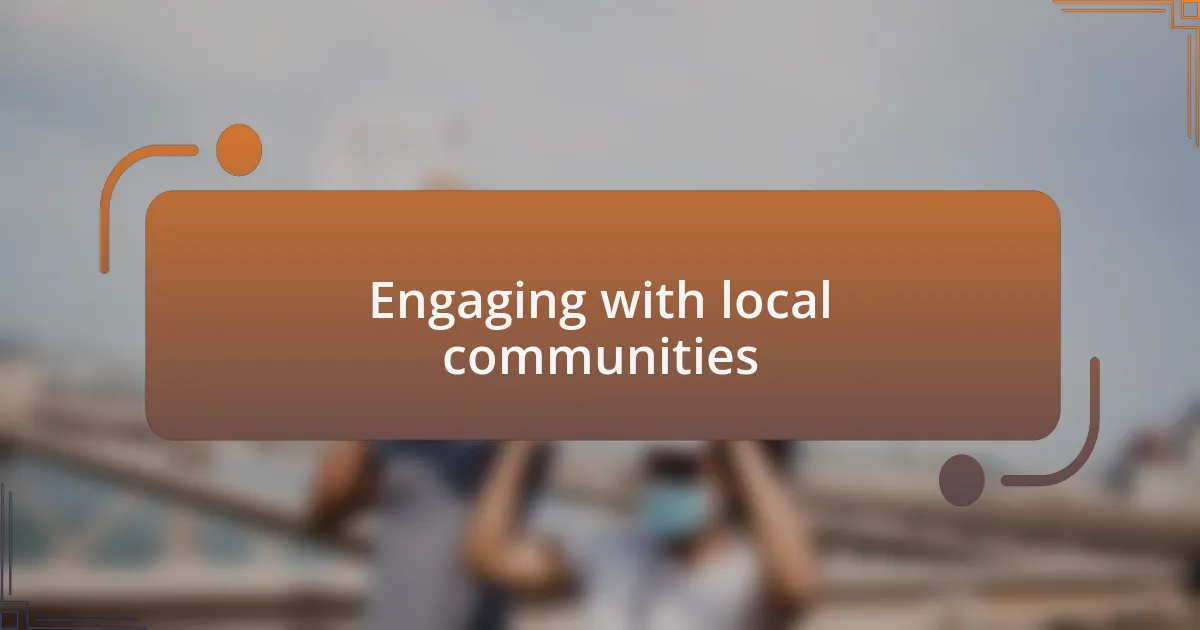
Engaging with local communities
Engaging with local communities is truly where the heart of pro-life advocacy beats. I remember organizing a neighborhood discussion group focused on reproductive health. Each person brought unique stories that needed to be heard, reinforcing the idea that community connection fosters understanding and support. Have you ever witnessed how open dialogues can break down barriers and build bridges?
Attending local events has shown me the power of grassroots engagement. At a community fair, I set up a booth offering resources and literature on pregnancy options. It was humbling to see individuals approach me with questions. Each interaction was an opportunity to create awareness and provide comfort. Isn’t it rewarding to be part of a conversation that can change lives?
Moreover, connecting with local religious groups has been transformative for me. I once co-hosted a workshop at a church where we discussed the importance of compassion toward those facing crisis pregnancies. Seeing the congregation’s willingness to get involved ignited a sense of hope within me. How often do we overlook the impact our local faith communities have in supporting life-affirming choices?
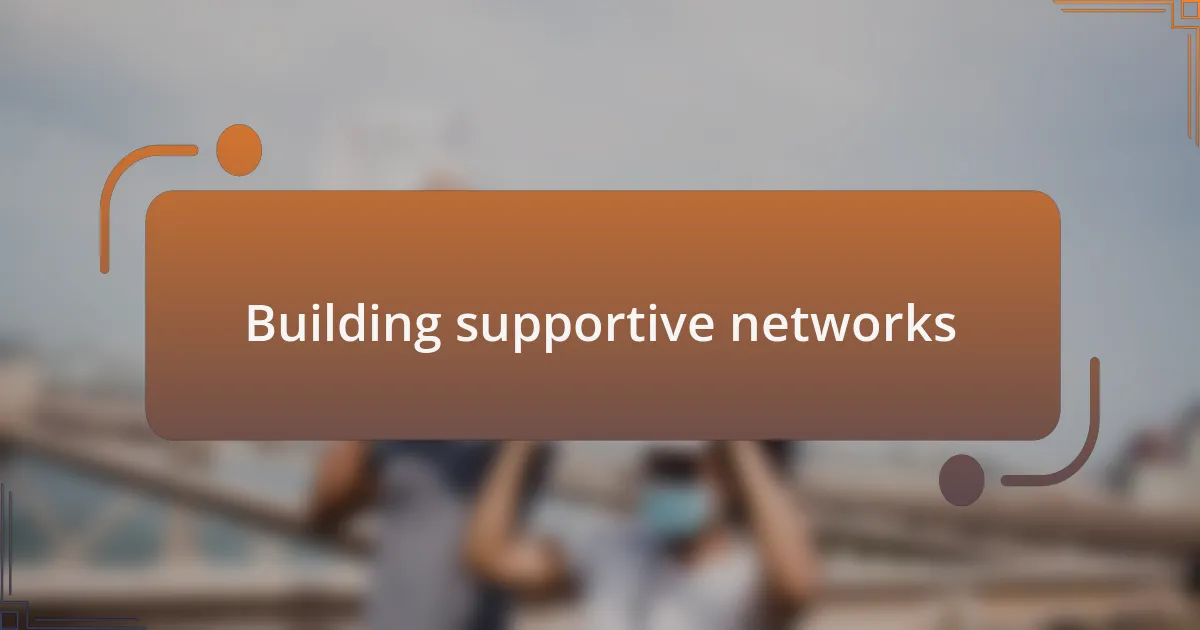
Building supportive networks
Building supportive networks has been essential in amplifying our pro-life message. I recall a particularly impactful moment when a group of us teamed up with a local mother’s group. Their enthusiasm and dedication to providing resources for new parents aligned perfectly with our advocacy goals. Have you ever experienced how collaboration can create a ripple effect, enriching everyone involved?
It’s fascinating how forming connections with local businesses can greatly enhance support systems. Last year, I worked with a small café that devoted a portion of their profits to support pregnancy resource centers. The owner shared her own story of finding unexpected help during her own pregnancy. Isn’t it amazing how personal experiences can unite us and drive collective action?
Even social media can serve as a powerful tool for building supportive networks. I initiated an online group aimed at sharing resources and success stories, and it quickly evolved into a vibrant community. Seeing members lift each other up in times of need brings me great joy. Have you noticed how virtual spaces can foster real connections that translate into tangible support?
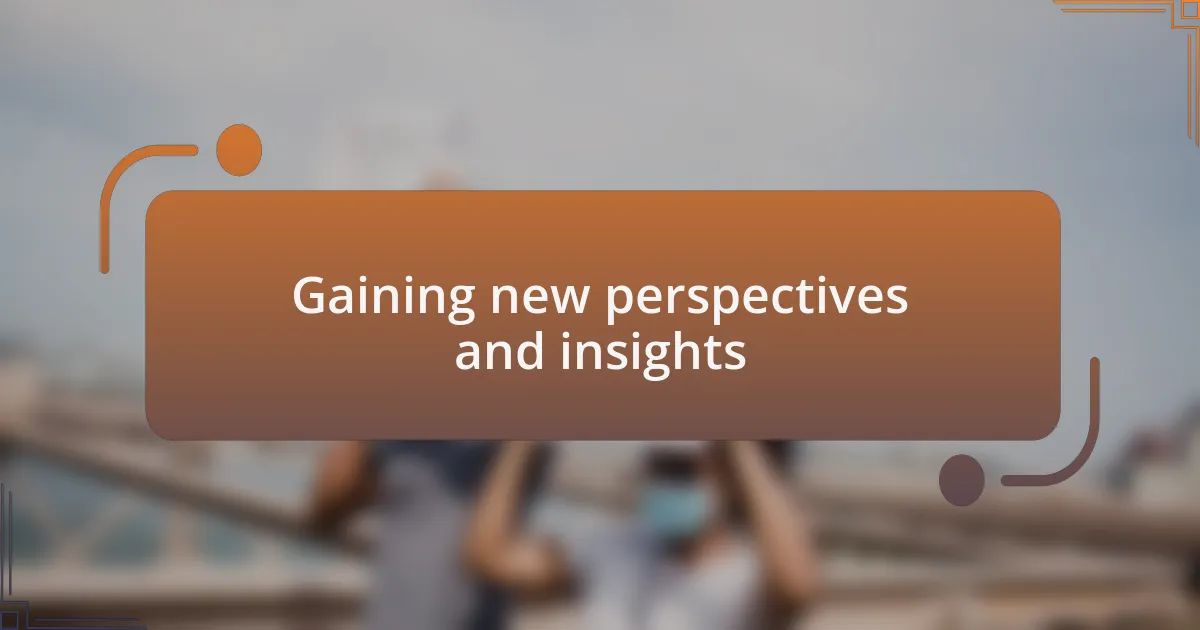
Gaining new perspectives and insights
Gaining new perspectives often comes from stepping outside our comfort zones and engaging with diverse voices. I remember attending a community forum where individuals from various backgrounds shared their stories about pregnancy and parenting. Listening to their experiences challenged my preconceived notions and deepened my empathy. Can you recall a time when hearing another person’s story changed your viewpoint?
It’s remarkable how each conversation can illuminate aspects we might not have considered. Through outreach events, I connected with a woman who had made a profoundly difficult choice regarding her pregnancy. Her journey was filled with complexities and emotions that I had only previously understood in theory. Reflecting on her story made me realize the need for compassion and understanding, rather than judgment. How can we expect to advocate effectively without fully grasping the multifaceted nature of these situations?
These interactions have not only broadened my perspective but also enriched my approach to advocacy. For example, after engaging with a group that provided services for single mothers, I discovered innovative ways to support our local community. Their insights on practical solutions sparked ideas I hadn’t thought of before. Have you ever had an experience where someone else’s insight led you to discover new ways to make a difference? It’s a reminder that growth often happens in dialogue, not silence.
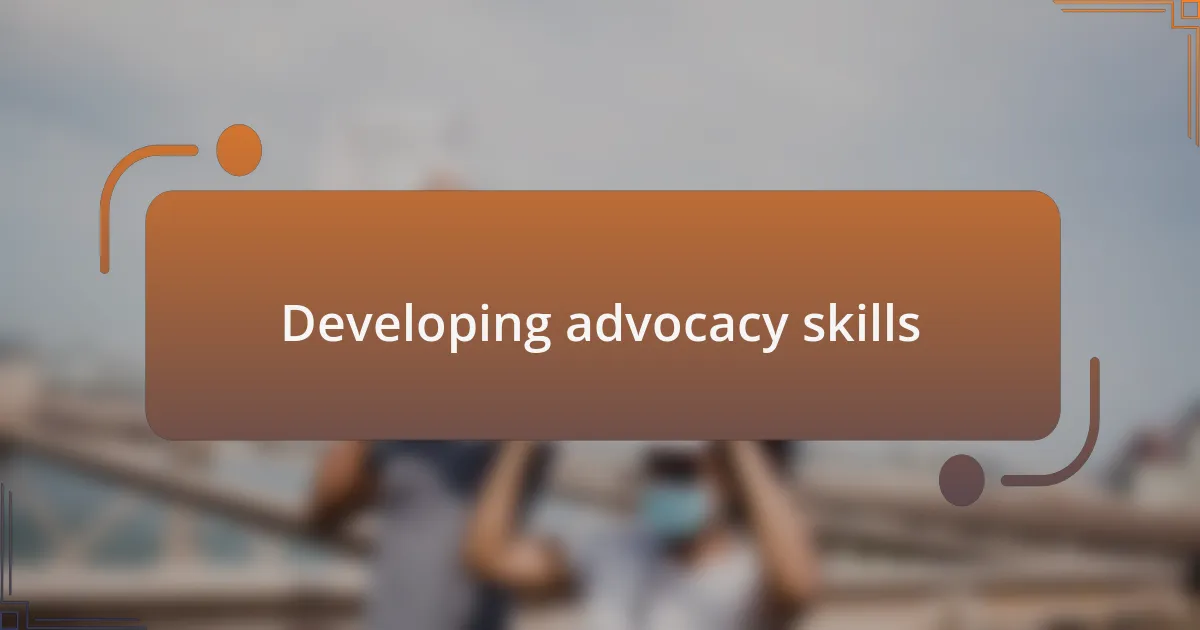
Developing advocacy skills
Developing advocacy skills is an ongoing journey that requires practice and reflection. During a recent volunteer event, I found myself in a discussion with a young woman who shared her struggles in accessing healthcare resources. As I listened, I realized that advocacy isn’t just about speaking; it’s about actively listening and understanding the barriers others face. Have you ever been in a situation where simply listening opened your eyes to a new understanding of an issue?
My experience has taught me that effective advocacy also hinges on the ability to communicate clearly and passionately. I remember drafting a letter to my local representative after learning about the urgent needs within our community regarding maternal support services. The process of articulating my thoughts not only clarified my stance but also empowered me to make a direct impact. How powerful it feels to convey your beliefs in a way that can lead to tangible change!
Collaborating with others is another invaluable aspect of honing advocacy skills. At a recent workshop, I worked alongside a diverse group of advocates and was struck by our varied approaches to similar issues. We shared strategies, adapted each other’s ideas, and energized one another’s efforts, creating a synergy that was truly inspiring. Have you ever collaborated with someone whose perspective shifted your approach? These experiences underscore the fact that advocacy is rarely a solitary endeavor; it flourishes in the rich interplay of voices and ideas.
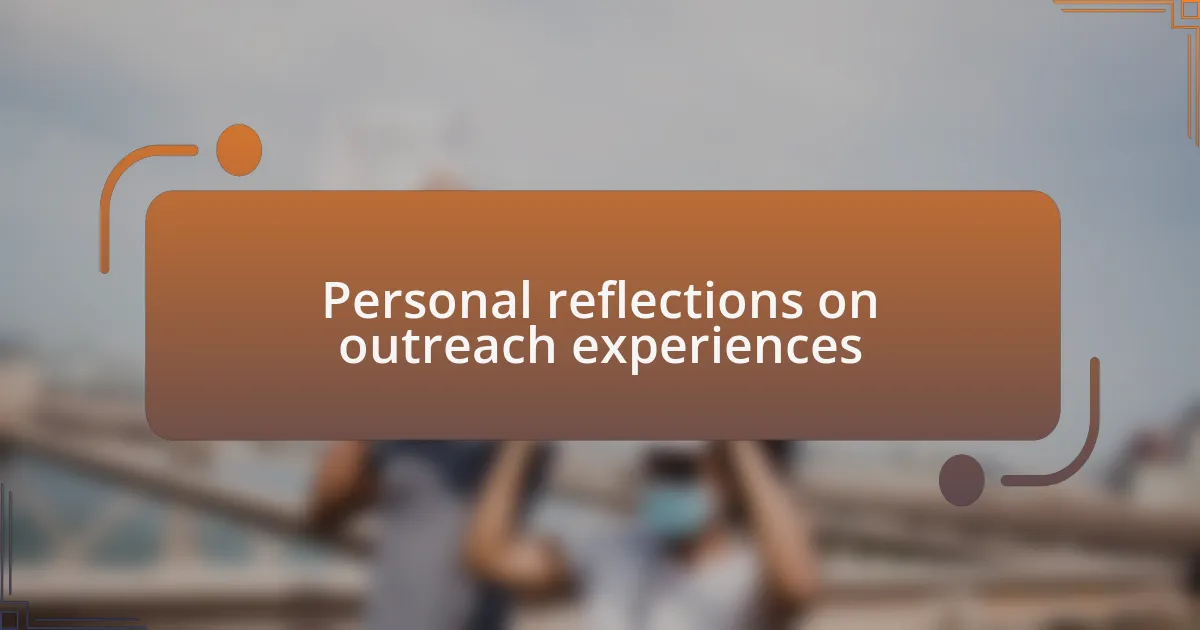
Personal reflections on outreach experiences
During my outreach experiences, I often found myself in moments of deep reflection. One encounter that stands out was speaking with a young mother who felt isolated in her struggles. As we talked, I could sense her vulnerability and pain. It struck me how sharing our stories could create a bridge of understanding, revealing the emotional depth beneath advocacy work. Have you ever felt that connection with someone, where words transformed the atmosphere between you?
Another memorable experience involved organizing a community event focused on supporting women facing difficult choices. I was overwhelmed with gratitude when a participant approached me afterward, sharing how she felt empowered by our discussion. It reminded me of the ripple effects our outreach can have. It’s not always about the numbers; sometimes, it’s about the single heart we touch. Have you experienced that moment of realization when you know you’ve made a difference, no matter how small?
Reflecting on these experiences, I recognize a profound lesson: outreach is a dialogue, not a monologue. Every interaction has the potential to shape our perspectives and strategies. I recall a workshop where volunteers shared their challenges and triumphs; it was enlightening to see how varied our paths could be yet how united we remained in purpose. How enriching is it to learn from each other and evolve together in our advocacy journey?